|
|
|
Sort Order |
|
|
|
Items / Page
|
|
|
|
|
|
|
| Srl | Item |
| 1 |
ID:
097047


|
|
|
| 2 |
ID:
120434
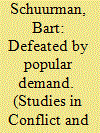

|
|
|
|
|
| Publication |
2013.
|
| Summary/Abstract |
Acquiring and maintaining public support is frequently cited as an important requirement for governments fighting non-state actors. But how exactly can public support influence the course of counterterrorism campaigns and thereby contribute to an escalation or de-escalation of violence? This article argues that public support can provide a mandate for action but that it can also set boundaries for the measures governments and their non-state adversaries can legitimately use. Fluctuations in the quantity and quality of public support for either side can expand or contract these boundaries, potentially instigating marked changes in conflict-related violence levels and affecting the efficacy of government countermeasures.
|
|
|
|
|
|
|
|
|
|
|
|
|
|
|
|
| 3 |
ID:
168898
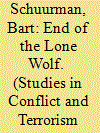

|
|
|
|
|
| Summary/Abstract |
This research note argues that the “lone wolf” typology should be fundamentally reconsidered. Based on a three-year empirical research project, two key points are made to support this argument. First, the authors found that ties to online and offline radical milieus are critical to lone actors' adoption and maintenance of both the motive and capability to commit acts of terrorism. Second, in terms of pre-attack behaviors, the majority of lone actors are not the stealthy and highly capable terrorists the “lone wolf” moniker alludes to. These findings not only urge a reconsideration of the utility of the lone-wolf concept, they are also particularly relevant for counterterrorism professionals, whose conceptions of this threat may have closed off avenues for detection and interdiction that do, in fact, exist.
|
|
|
|
|
|
|
|
|
|
|
|
|
|
|
|
| 4 |
ID:
142529
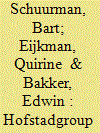

|
|
|
|
|
| Summary/Abstract |
Despite the Dutch Hofstadgroup's status in the literature as a prime example of a homegrown Salafi-Jihadist terrorist network, the authors, using newly available primary sources, argue that this classification is to a large extent unwarranted. The lack of a rudimentary organizational structure, the existence of divergent views on the legitimacy and desirability of political violence, and the absence of collective action in pursuit of a violent goal rule out labeling the Hofstadgroup as a terrorist organization or network for the largest part of its 2002–2005 existence. A smaller subgroup of extremists did begin developing into a proto-terrorist inner circle from late 2003 onwards. In 2004, this extremist core brought forth the murderer of filmmaker Theo van Gogh. But it was only in 2005, when the remnants of the inner circle tried to resuscitate the Hofstadgroup in the wake of the arrests that had followed Van Gogh's death, that these individual actions were replaced by the communal efforts necessary to warrant the “jihadist network” label often ascribed to the Hofstadgroup. Arguably the most archetypical aspect of the Hofstadgroup case is its ability to illustrate the deleterious effects of the ongoing scarcity of primary sources-based research on terrorism.
|
|
|
|
|
|
|
|
|
|
|
|
|
|
|
|
| 5 |
ID:
141151


|
|
|
|
|
| Summary/Abstract |
In 2013, France launched Operation ‘Serval’ to halt the southwards advance of Islamist insurgents in Mali. Using a Clausewitzian analytical framework, this article provides an assessment of France’s political and military aims in Mali and the degree to which they have been attained. Clear political goals, coordinated international diplomacy, an effective use of military force and blunders by the rebel forces turned ‘Serval’ into a short-term success. Strategically, however, the mission has proven unable to address the conflict’s underlying causes. Serval’s long-term effect is probably better measured by what it prevented than what it contributed.
|
|
|
|
|
|
|
|
|
|
|
|
|
|
|
|
| 6 |
ID:
175709
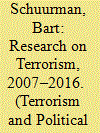

|
|
|
|
|
| Summary/Abstract |
Research on terrorism has long been criticized for its inability to overcome enduring methodological issues. These include an overreliance on secondary sources and the associated literature review methodology, a scarcity of statistical analyses, a tendency for authors to work alone rather than collaborate with colleagues, and the large number of one-time contributors to the field. However, the reviews that have brought these issues to light describe the field as it developed until 2007. This article investigates to what extent these issues have endured in the 2007–2016 period by constructing a database on all of the articles published in nine leading journals on terrorism (N = 3442). The results show that the use of primary data has increased considerably and is continuing to do so. Scholars have also begun to adapt a wider variety of data-gathering techniques, greatly diminishing the overreliance on literature reviews that was noted from the 1980s through to the early 2000s. These positive changes should not obscure enduring issues. Despite improvements, most scholars continue to work alone and most authors are one-time contributors. Overall, however, the field of terrorism studies appears to have made considerable steps towards addressing long-standing issues.
|
|
|
|
|
|
|
|
|
|
|
|
|
|
|
|
| 7 |
ID:
159886
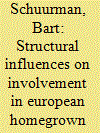

|
|
|
|
|
| Summary/Abstract |
This article empirically assesses the applicability of structural-level hypotheses for involvement in terrorism within the context of European homegrown jihadism. It uses these hypotheses to study how structural factors influenced involvement in the Dutch “Hofstadgroup.” Structural factors enabled the group’s emergence and its participants’ adoption of extremist views. They also motivated involvement in political violence and a shift in some participants’ focus from joining Islamist insurgents overseas to committing terrorism in the Netherlands. Finally, structural factors precipitated an actual terrorist attack. No support is found for the frequently encountered argument that discrimination and exclusion drive involvement in European homegrown jihadism. Instead, geopolitical grievances were prime drivers of this process.
|
|
|
|
|
|
|
|
|
|
|
|
|
|
|
|
| 8 |
ID:
103965
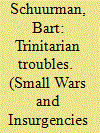

|
|
|
|
|
| Publication |
2011.
|
| Summary/Abstract |
It seems paradoxical that powerful Western states are at their most vulnerable when the disparity in military capabilities between them and their opponents is at its largest. Yet it is precisely in such 'asymmetric conflicts' that Western countries have failed to achieve their overall political objectives the most often. Focusing on the post-1945 world, this article will examine governmental, military, and societal reasons for Western failures in asymmetric conflicts. Politicians' lack of understanding regarding war's fundamental nature, militaries' tendency to dissociate operational goals from grand strategy objectives and citizens' moral aversion to warfare appear to be among the main obstacles to success.
|
|
|
|
|
|
|
|
|
|
|
|
|
|
|
|
|
|
|
|
|